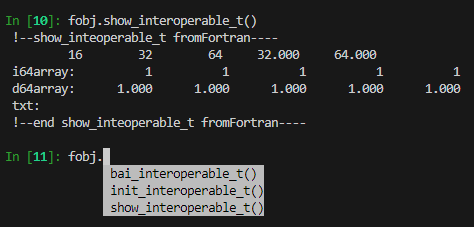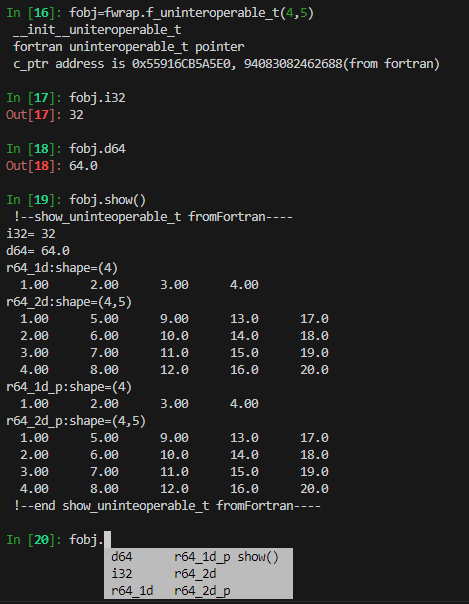概要
fortranとCを相互に利用するための規格がf2003で導入されましたが、基本的な型や関数のみが対象であり、fortranの allocatable なデータや classなどを扱うことはできませんでした。その後f2018規格では CFI_cdesc_t などの新たなC相互運用機能が導入され、allocatableなデータや、integer,intent(inout) :: iarray(:,:)といったfortran特有の形状無指定配列などをC言語で扱うことが可能となりました。また、fortranのclassを指すポインタを返り値とする関数を定義すれば、C言語側からfortranクラスのメモリ管理が可能となります。
本稿では、fortranのクラスや形状無指定配列をCやPythonから利用する方法を例示します。
実際に動かす場合はGitHubからコードをクローンできます。
取り組み背景
fortran2003以降の機能を多数利用したFortranライブラリを既に所有しており、これらをPythonなどから呼び出して活用できれば便利だと思っていました。そのようななか、偶然Cythonを扱う機会があり、PythonからC/C++を自在に操ることができることが分かりました。
そこで、fortran2018の新機能であるCFI_で始まる定数や関数を試したところ、従来はPython側から利用することが難しかったFortran機能の幾つかがCythonを経由して利用可能になることがわかりました。なお、Cython(https://cython.readthedocs.io/en/latest/index.html) の使い方は公式ページを見てください。
f2003のC互換機能のみを使う場合
「構造体の中にcontainsによるメソッドがなく、データにallocatableなど要素もない」という、下記のような構造体定義の場合には簡単にPython (Cython) と相互運用可能です。CythonはCを経由するので、C言語のヘッダファイルを用意しておく必要がある点が面倒ですが、allocatableな配列等をCから扱う場面に比べれば簡単な記述で事足ります。
Cyton
型の定義
まずFortran側の定義です。
use iso_c_binding
type, bind(c) :: interoperable_t
integer(c_int16_t) :: i16 = 16
integer(c_int32_t) :: i32 = 32
integer(c_int64_t) :: i64 = 64
real(c_float) :: f32 = 32.0_c_float
real(c_double) :: d64 = 64.0_c_double
integer(c_int64_t) :: i64array(5) = 1_c_int64_t
real(c_double) :: d64array(5) = 1.0_c_double
character(len=1,kind=c_char) :: txt(10) = ""//c_null_char
end type
subroutine init_interoperable_t(self) bind(c)
type(interoperable_t), intent(inout) :: self
self = interoperable_t()
end subroutine
subroutine show_interoperable_t(self) bind(c)
type(interoperable_t), intent(in) :: self
character(len=:),allocatable :: fmt
end subroutine
subroutine bai_interoperable_t(self) bind(c)
type(interoperable_t), intent(inout) :: self
!... 略 ...
end subroutine
CythonはPythonコードをC言語に翻訳するツールなので、上記のFortran定義をCで利用するためのヘッダを下記のように自作します。
typedef struct
{
int16_t i16;
int32_t i32;
int64_t i64;
float f32;
double d64;
int64_t i64array[5];
double d64array[5];
char txt[10];
}interoperable_t;
/* 以下、Fortranのbind(c)されたサブルーチン */
void init_interoperable_t(interoperable_t* ptr);
void bai_interoperable_t(interoperable_t* ptr);
void show_interoperable_t(interoperable_t* ptr);
上記の準備ができたら、構造体をPythonから使いやすいようにラッピングコードを作ります。
まずは、f_functions.hを利用するためのヘッダファイル相当のpxdファイルを作ります。
cdef extern from "f_functions.h":
ctypedef struct interoperable_t:
int16_t i16
int32_t i32
int64_t i64
float f32
double d64
int64_t i64array[5]
double d64array[5]
char txt[10]
void init_interoperable_t(interoperable_t* ptr)
void bai_interoperable_t(interoperable_t* ptr)
void show_interoperable_t(interoperable_t* ptr)
PytonでFortranの型をヒープに割付けて使う
Python, C, Fortranで扱うことのできるデータ実体をメモリ上のどこかに確保する必要があります。本稿では、指し示すメモリ実体がただ一つになるように実装します。(Pythonで割り付けたメモリをfortranに渡す際にコピーが生じないということです)
ここでは、interoperable_tの型をCのmalloc関数を使って割り付け、これをクラス内部の_thisptrという要素として保持します。これはfortranと互換なのでそのままfortranルーチン(show_interoperable_tなど)の引数として関数の実引数に渡すことができます。割り付けたメモリ領域は、Pythonオブジェクトが破棄される時に自動で解放する必要があるため、__dealloc__も定義しておきます。
必須ではないですが、interoperable_tを引数に取る関数は、Pythonのクラスメソッドとして追加しておくとPythonからはクラスのように振る舞わせることができ、ipythonでタブ補完が効くので便利です。
なお、こんな面倒なことをしなくても、numpyでアライメントに注意しながらユーザ定義構造体を作ればctypesやnumpyの関数を使ってFortranルーチンに構造体を渡すこともできます。ここであえてこのような記述方法を紹介したのは、fortranのclassをうまくラッピングする方法としてこの記述方法が便利だからです。
蛇足ですが、C++をPythonからCython経由でラッピングする方法も似た感じになります。
cdef class f_interoperable_t:
cdef interoperable_t *_thisptr
def __cinit__(self):
self._thisptr = <interoperable_t*> malloc(sizeof(interoperable_t))
def __dealloc__(self):
if self._thisptr != NULL:
free(self._thisptr)
cpdef init_interoperable_t(self):
init_interoperable_t(self._thisptr)
cpdef bai_interoperable_t(self):
bai_interoperable_t(self._thisptr)
cpdef show_interoperable_t(self):
show_interoperable_t(self._thisptr)
以上で、Fortranの構造体(C互換のもの)をPythonから利用できるようになりました。
下記のようにインポートした後のプロンプト例を示します。
import fwrap
fobj = fwrap.f_interoperable_t()
fobj.init_interoperable_t()
Fortranコードの呼び出しも正常にできており、pythonクラスの補完も効いていることが分かります。
f2018のC互換機能を使う場合
まず、利用したいFortranコード(ここではlibfort.f90)があるとします。
コード詳細(libfort.f90)
module ISO_Fortran_binding_test
use iso_c_binding
use iso_fortran_env
implicit none
public
type :: base_t
integer :: i32 = 32
real(real64) :: d64 = 64.0_real64
end type
type, extends(base_t) :: uninteroperable_t
real(real64),allocatable :: r64_1d(:), r64_2d(:,:)
real(real64),pointer :: r64_1d_p(:) => null(), r64_2d_p(:,:) => null()
contains
final :: final_uniteroperable_t
procedure :: show_uninteroperable_t
end type
interface uninteroperable_t
module procedure :: uninteroperable_t__init__
end interface
contains
impure elemental subroutine final_uniteroperable_t(self)
type(uninteroperable_t),intent(inout) :: self
if(associated(self%r64_1d_p))then
deallocate(self%r64_1d_p)
endif
if(associated(self%r64_2d_p))then
deallocate(self%r64_2d_p)
endif
print*, "__final__uniteroperable_t"
end subroutine
impure elemental function uninteroperable_t__init__(n,m) result(res)
integer, intent(in) :: n,m
type(uninteroperable_t) :: res
print*, "__init__uniteroperable_t"
if(.not.allocated(res%r64_1d))then
res%r64_1d = arange_r64_allocatable(n)
end if
if(.not.allocated(res%r64_2d))then
res%r64_2d = reshape(arange_r64_allocatable(n*m),[n,m])
end if
if(.not.associated(res%r64_1d_p))then
!allocate(res%r64_1d_p(n),source=1d0)
res%r64_1d_p => arange_r64_pointer(n)
end if
if(.not.associated(res%r64_2d_p))then
!allocate(res%r64_2d_p(n,m),source=1d0)
res%r64_2d_p => reshape_pointer_1dto2d(n,m,arange_r64_pointer(n*m))
end if
end function
impure elemental subroutine show_uninteroperable_t(self)
class(uninteroperable_t),intent(in) :: self
integer,allocatable :: array_shape(:)
write(output_unit,'(1x,a)') "!--show_uninteoperable_t fromFortran----"
write(output_unit,'("i32=",i3)') self%i32
write(output_unit,'("d64=",f5.1)') self%d64
array_shape = shape(self%r64_1d)
write(output_unit,'("r64_1d:shape=(",i0,")")') array_shape
call showarray1d(array_shape,self%r64_1d)
array_shape = shape(self%r64_2d)
write(output_unit,'("r64_2d:shape=(",i0,",",i0,")")') array_shape
call showarray2d(array_shape,self%r64_2d)
array_shape = shape(self%r64_1d_p)
write(output_unit,'("r64_1d_p:shape=(",i0,")")') array_shape
call showarray1d(array_shape,self%r64_1d_p)
array_shape = shape(self%r64_2d_p)
write(output_unit,'("r64_2d_p:shape=(",i0,",",i0,")")') array_shape
call showarray2d(array_shape,self%r64_2d_p)
write(output_unit,'(1x,a)') "!--end show_uninteoperable_t fromFortran----"
contains
subroutine showarray1d(ashape,array)
integer :: ashape(:)
real(real64) :: array(:)
integer :: i
do i = 1,ashape(1)
write(output_unit,'(g10.3)',advance="no")array(i)
end do
write(output_unit,'(1x)',advance="yes")
end subroutine
subroutine showarray2d(ashape,array)
integer :: ashape(:)
real(real64) :: array(:,:)
integer :: i,j
do j = 1,ashape(1)
do i = 1,ashape(2)
write(output_unit,'(g10.3)',advance="no")array(j,i)
end do
write(output_unit,'(1x)',advance="yes")
end do
end subroutine
end subroutine
!------------------------------------------------------------
function arange_r64_allocatable(n) result(res)
integer,intent(in) :: n
real(real64),allocatable :: res(:)
integer :: i
allocate(res(n))
do i = 1,n
res(i) = i
end do
end function
function arange_r64_pointer(n) result(res)
integer,intent(in) :: n
real(real64),pointer :: res(:)
integer :: i
allocate(res(n))
do i = 1,n
res(i) = i
end do
end function
function reshape_pointer_1dto2d(n,m,pp) result(res)
integer,intent(in) :: n,m
real(real64),pointer :: pp(:)
real(real64),pointer :: res(:,:)
res(1:n,1:m) => pp(1:n*m)
end function
end module
これをPythonから呼び出して使用する場合、やることは多数あります。
- 使いたいfortranライブラリ(libfort.f90)を
-fPICをつけてビルドしておく。 - Cythonから
ISO_Fortran_binding.hを使えるようにする(ISO_Fortran_binding.pxdを作成)。 -
CFI_CDESC_T(r)のように引数をとるCマクロをCythonで使えるようにするハック(cy_futils.c,cy_futils.h, cy_futils.pxdを作成) - Fortran側で、C言語向けインターフェースを作る(libfort_cinterface.f90)。
- libfort_cinterface.f90をcythonから使うためのコード(fwrap.pxd)
- libfort.f90のクラスに対応したPythonクラスの定義(fwrap.pyx)
インターフェースの作成
ISO_Fortran_bindingをcythonから利用可能にするコード(ISO_Fortran_binding.pxd)
from libc.stdint cimport *
from libc.stddef cimport *
cdef extern from "<ISO_Fortran_binding.h>" nogil:
#/* Constants, defined as macros. */
int CFI_VERSION
int CFI_MAX_RANK
#/* Attributes. */
int CFI_attribute_pointer
int CFI_attribute_allocatable
int CFI_attribute_other
#/* Error codes.
#CFI_INVALID_STRIDE should be defined in the standard because they are useful to the implementation of the functions.
#*/
int CFI_SUCCESS
int CFI_FAILURE
int CFI_ERROR_BASE_ADDR_NULL
int CFI_ERROR_BASE_ADDR_NOT_NULL
int CFI_INVALID_ELEM_LEN
int CFI_INVALID_RANK
int CFI_INVALID_TYPE
int CFI_INVALID_ATTRIBUTE
int CFI_INVALID_EXTENT
int CFI_INVALID_STRIDE
int CFI_INVALID_DESCRIPTOR
int CFI_ERROR_MEM_ALLOCATION
int CFI_ERROR_OUT_OF_BOUNDS
#/* CFI type definitions. */
ctypedef ptrdiff_t CFI_index_t
ctypedef int8_t CFI_rank_t
ctypedef int8_t CFI_attribute_t
ctypedef int16_t CFI_type_t
#/* CFI_dim_t. */
ctypedef struct CFI_dim_t:
CFI_index_t lower_bound
CFI_index_t extent
CFI_index_t sm
ctypedef struct CFI_cdesc_t:
void *base_addr
size_t elem_len
int version
CFI_rank_t rank
CFI_attribute_t attribute
CFI_type_t type
CFI_dim_t dim[]
#CFI_cdesc_t* CFI_CDESC_T_cwrap(int r)
#/* CFI function declarations. */
void *CFI_address (const CFI_cdesc_t *, const CFI_index_t [])
int CFI_allocate (CFI_cdesc_t *, const CFI_index_t [], const CFI_index_t [],
size_t)
int CFI_deallocate (CFI_cdesc_t *)
int CFI_establish (CFI_cdesc_t *, void *, CFI_attribute_t, CFI_type_t, size_t,
CFI_rank_t, const CFI_index_t [])
int CFI_is_contiguous (const CFI_cdesc_t *)
int CFI_section (CFI_cdesc_t *, const CFI_cdesc_t *, const CFI_index_t [],
const CFI_index_t [], const CFI_index_t [])
int CFI_select_part (CFI_cdesc_t *, const CFI_cdesc_t *, size_t, size_t)
int CFI_setpointer (CFI_cdesc_t *, CFI_cdesc_t *, const CFI_index_t [])
#define CFI_type_mask 0xFF
int CFI_type_kind_shift
#/* intrinsic types. Their kind number defines their storage size. */
int CFI_type_Integer
int CFI_type_Logical
int CFI_type_Real
int CFI_type_Complex
int CFI_type_Character
#/* Types with no kind. */
int CFI_type_struct
int CFI_type_cptr
int CFI_type_cfunptr
int CFI_type_other
int CFI_type_signed_char
int CFI_type_short
int CFI_type_int
int CFI_type_long
int CFI_type_long_long
int CFI_type_size_t
int CFI_type_int8_t
int CFI_type_int16_t
int CFI_type_int32_t
int CFI_type_int64_t
int CFI_type_int_least8_t
int CFI_type_int_least16_t
int CFI_type_int_least32_t
int CFI_type_int_least64_t
int CFI_type_int_fast8_t
int CFI_type_int_fast16_t
int CFI_type_int_fast32_t
int CFI_type_int_fast64_t
int CFI_type_intmax_t
int CFI_type_intptr_t
int CFI_type_ptrdiff_t
int CFI_type_int128_t
int CFI_type_int_least128_t
int CFI_type_int_fast128_t
int CFI_type_Bool
int CFI_type_float
int CFI_type_double
int CFI_type_long_double
int CFI_type_float128
int CFI_type_float_Complex
int CFI_type_double_Complex
int CFI_type_long_double_Complex
int CFI_type_float128_Complex
cythonユーティリティ関数(cy_futils.c)
#include <ISO_Fortran_binding.h>
#include <stdlib.h>
CFI_cdesc_t* CFI_CDESC_T_cwrap(int r)
{
typedef CFI_CDESC_T(1) CFI_CDESC_T0;
typedef CFI_CDESC_T(1) CFI_CDESC_T1;
typedef CFI_CDESC_T(2) CFI_CDESC_T2;
typedef CFI_CDESC_T(3) CFI_CDESC_T3;
typedef CFI_CDESC_T(4) CFI_CDESC_T4;
typedef CFI_CDESC_T(5) CFI_CDESC_T5;
typedef CFI_CDESC_T(6) CFI_CDESC_T6;
typedef CFI_CDESC_T(7) CFI_CDESC_T7;
CFI_cdesc_t *array = NULL;
switch(r){
case 0:
CFI_CDESC_T0 *Fobject0;
Fobject0 = (CFI_CDESC_T0*) malloc(sizeof(CFI_CDESC_T0));
array = (CFI_cdesc_t*) Fobject0;
break;
case 1:
CFI_CDESC_T1 *Fobject1;
Fobject1 = (CFI_CDESC_T1*) malloc(sizeof(CFI_CDESC_T1));
array = (CFI_cdesc_t*) Fobject1;
break;
case 2:
CFI_CDESC_T2 *Fobject2;
Fobject2 = (CFI_CDESC_T2*) malloc(sizeof(CFI_CDESC_T2));
array = (CFI_cdesc_t*) Fobject2;
break;
case 3:
CFI_CDESC_T3 *Fobject3;
Fobject3 = (CFI_CDESC_T3*) malloc(sizeof(CFI_CDESC_T3));
array = (CFI_cdesc_t*) Fobject3;
break;
case 4:
CFI_CDESC_T4 *Fobject4;
Fobject4 = (CFI_CDESC_T4*) malloc(sizeof(CFI_CDESC_T4));
array = (CFI_cdesc_t*) Fobject4;
break;
case 5:
CFI_CDESC_T5 *Fobject5;
Fobject5 = (CFI_CDESC_T5*) malloc(sizeof(CFI_CDESC_T5));
array = (CFI_cdesc_t*) Fobject5;
break;
case 6:
CFI_CDESC_T6 *Fobject6;
Fobject6 = (CFI_CDESC_T6*) malloc(sizeof(CFI_CDESC_T6));
array = (CFI_cdesc_t*) Fobject6;
break;
case 7:
CFI_CDESC_T7 *Fobject7;
Fobject7 = (CFI_CDESC_T7*) malloc(sizeof(CFI_CDESC_T7));
array = (CFI_cdesc_t*) Fobject7;
break;
}
return array;
}
cythonユーティリティ関数(cy_futils.h)
#include <ISO_Fortran_binding.h>
CFI_cdesc_t* CFI_CDESC_T_cwrap(int r);
cythonユーティリティ関数(cy_futils.pxd)
from ISO_Fortran_binding cimport *
cdef extern from "cy_futils.h" nogil:
CFI_cdesc_t* CFI_CDESC_T_cwrap(int r)
fortranとCのインターフェースモジュール(libfort_cinterfaces.f90)
module ISO_Fortran_binding_test_cinterface
use ISO_Fortran_binding_test
implicit none
public
contains
function generate_uninteroperable_t_pointer(n,m) bind(c) result(ptr)
use iso_fortran_env
integer(c_int) :: n,m
type(c_ptr) :: ptr
type(uninteroperable_t),pointer :: fobj
allocate(fobj, source=uninteroperable_t(n,m))
ptr = c_loc(fobj)
print*,"fortran uninteroperable_t pointer"
print '(1x,A,Z12,",",I15,A)',"c_ptr address is 0x",transfer(c_loc(fobj),0_int64), &
transfer(c_loc(fobj),0_int64),"(from fortran)"
end function
function generate_uninteroperable_t_array_pointer(narray,n,m) bind(c) result(ptr)
use iso_fortran_env
integer(c_int) :: narray,n,m
type(c_ptr) :: ptr
type(uninteroperable_t),pointer :: fobj(:)
integer :: i
allocate(fobj(narray))
do i = 1,narray
fobj(i) = uninteroperable_t(n,m)
end do
ptr = c_loc(fobj)
print*,"fortran uninteroperable_t pointer (array version)"
print '(1x,A,Z12,",",I15,A)',"c_ptr address is 0x",transfer(c_loc(fobj),0_int64), &
transfer(c_loc(fobj),0_int64),"(from fortran)"
end function
subroutine dealloc_uninteroperable_t(cptr) bind(c)
type(c_ptr),intent(in),value :: cptr
type(uninteroperable_t),pointer :: fptr => null()
call c_f_pointer(cptr, fptr)
if(associated(fptr))then
deallocate(fptr)
print*,"dealloc_uninteroperable_t from fortran"
end if
end subroutine
subroutine dealloc_uninteroperable_t_array(cptr, r) bind(c)
type(c_ptr),intent(in),value :: cptr
type(uninteroperable_t),pointer :: fptr(:) => null()
integer :: r(1)
call c_f_pointer(cptr, fptr, r)
if(associated(fptr))then
deallocate(fptr)
print*,"dealloc_uninteroperable_t from fortran"
end if
end subroutine
subroutine c_show_uninteroperable_t(cptr) bind(c)
type(c_ptr),intent(in),value :: cptr
type(uninteroperable_t),pointer :: fptr => null()
call c_f_pointer(cptr, fptr)
call fptr%show_uninteroperable_t()
end subroutine
subroutine c_uninteroperable_t_memoryview(cptr, &
& i32, d64, r64_1d, r64_2d, r64_1d_p, r64_2d_p) bind(c)
type(c_ptr),intent(in),value :: cptr
type(uninteroperable_t),pointer :: fptr => null()
integer(int32) :: i32
real(real64) :: d64
real(real64),pointer :: r64_1d(:), r64_2d(:,:)
real(real64),pointer :: r64_1d_p(:), r64_2d_p(:,:)
call c_f_pointer(cptr, fptr)
i32 = fptr%i32
d64 = fptr%d64
r64_1d => fptr%r64_1d
r64_2d => fptr%r64_2d
r64_1d_p => fptr%r64_1d_p
r64_2d_p => fptr%r64_2d_p
end subroutine
end module
libfort_cinterfaces.f90のcythonインターフェース(fwrap.pxd)
cimport numpy as np
from ISO_Fortran_binding cimport CFI_cdesc_t
from libc.stdlib cimport *
from libc.stdint cimport (
int16_t,
int32_t,
int64_t,
)
cdef extern from "f_functions.h":
ctypedef struct interoperable_t:
int16_t i16
int32_t i32
int64_t i64
float f32
double d64
int64_t i64array[5]
double d64array[5]
char txt[10]
void init_interoperable_t(interoperable_t* ptr)
void bai_interoperable_t(interoperable_t* ptr)
void show_interoperable_t(interoperable_t* ptr)
void* generate_uninteroperable_t_pointer(int* n, int* m)
void* generate_uninteroperable_t_array_pointer(int* n_array, int* n, int* m)
void dealloc_uninteroperable_t(void* ptr)
void dealloc_uninteroperable_t_array(void* ptr, int* r)
void c_show_uninteroperable_t(void* ptr)
void c_uninteroperable_t_memoryview(void* ptr,
int32_t* i32, double* d64,
CFI_cdesc_t* r64_1d, CFI_cdesc_t* r64_2d,
CFI_cdesc_t* r64_1d_p, CFI_cdesc_t* r64_2d_p)
cimport numpy as np
from ISO_Fortran_binding cimport CFI_cdesc_t
from libc.stdlib cimport *
from libc.stdint cimport (
int16_t,
int32_t,
int64_t,
)
cdef extern from "f_functions.h":
ctypedef struct interoperable_t:
int16_t i16
int32_t i32
int64_t i64
float f32
double d64
int64_t i64array[5]
double d64array[5]
char txt[10]
void init_interoperable_t(interoperable_t* ptr)
void bai_interoperable_t(interoperable_t* ptr)
void show_interoperable_t(interoperable_t* ptr)
void* generate_uninteroperable_t_pointer(int* n, int* m)
void* generate_uninteroperable_t_array_pointer(int* n_array, int* n, int* m)
void dealloc_uninteroperable_t(void* ptr)
void dealloc_uninteroperable_t_array(void* ptr, int* r)
void c_show_uninteroperable_t(void* ptr)
void c_uninteroperable_t_memoryview(void* ptr,
int32_t* i32, double* d64,
CFI_cdesc_t* r64_1d, CFI_cdesc_t* r64_2d,
CFI_cdesc_t* r64_1d_p, CFI_cdesc_t* r64_2d_p)
libfort.f90に対応するpythonクラス(fwrap.pyx)
import numpy as np
from cy_futils cimport CFI_CDESC_T_cwrap
from ISO_Fortran_binding cimport (
CFI_attribute_allocatable,
CFI_attribute_pointer,
CFI_establish,
CFI_type_double,
)
cdef class f_interoperable_t:
cdef interoperable_t *_thisptr
def __cinit__(self):
self._thisptr = <interoperable_t*> malloc(sizeof(interoperable_t))
def __dealloc__(self):
if self._thisptr != NULL:
free(self._thisptr)
cpdef init_interoperable_t(self):
init_interoperable_t(self._thisptr)
cpdef bai_interoperable_t(self):
bai_interoperable_t(self._thisptr)
cpdef show_interoperable_t(self):
show_interoperable_t(self._thisptr)
cdef class f_uninteroperable_t:
cdef void *_thisptr
cdef public int32_t i32
cdef public double d64
cdef public double[:] r64_1d
cdef public double[::1,:] r64_2d
cdef public double[:] r64_1d_p
cdef public double[::1,:] r64_2d_p
def __cinit__(self, int n, int m):
self._thisptr = <void*> generate_uninteroperable_t_pointer(&n, &m)
cdef CFI_cdesc_t* c_r64_1d = CFI_CDESC_T_cwrap(1)
cdef CFI_cdesc_t* c_r64_2d = CFI_CDESC_T_cwrap(2)
cdef CFI_cdesc_t* c_r64_1d_p = CFI_CDESC_T_cwrap(1)
cdef CFI_cdesc_t* c_r64_2d_p = CFI_CDESC_T_cwrap(2)
CFI_establish(c_r64_1d, NULL, CFI_attribute_pointer,CFI_type_double,8,1,NULL)
CFI_establish(c_r64_2d, NULL, CFI_attribute_pointer,CFI_type_double,8,2,NULL)
CFI_establish(c_r64_1d_p, NULL, CFI_attribute_pointer,CFI_type_double,8,1,NULL)
CFI_establish(c_r64_2d_p, NULL, CFI_attribute_pointer,CFI_type_double,8,2,NULL)
c_uninteroperable_t_memoryview(self._thisptr,&self.i32,&self.d64,c_r64_1d,c_r64_2d,c_r64_1d_p,c_r64_2d_p)
self.r64_1d = <double[:c_r64_1d.dim[0].extent]> c_r64_1d.base_addr
self.r64_2d = (<double[:c_r64_2d.dim[1].extent,:c_r64_2d.dim[0].extent]> c_r64_2d.base_addr).T
self.r64_1d_p = <double[:c_r64_1d_p.dim[0].extent]> c_r64_1d_p.base_addr
self.r64_2d_p = (<double[:c_r64_2d_p.dim[1].extent,:c_r64_2d.dim[0].extent]> c_r64_2d_p.base_addr).T
def __dealloc__(self):
if self._thisptr != NULL:
dealloc_uninteroperable_t(self._thisptr)
cpdef show(self):
c_show_uninteroperable_t(self._thisptr)
Pytonからの利用例
終わりに
頑張ってFortranのクラスをPythonから使えるようにできたものの、かなり面倒でした。
ただ、Fortran内部の配列をnumpy配列としてコピーレスで利用できるので、性能面ではかなり良いのではないかと思います。
もっと詳しく説明したかったのですが、時間もないのでここまで。「コピーレスかつFortranクラスの利用」を簡単にできる方法があれば教えていただけるとありがたいです。
次はf90wrap を調べてみたいです。

